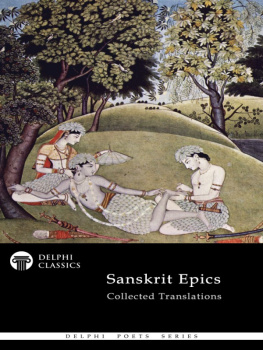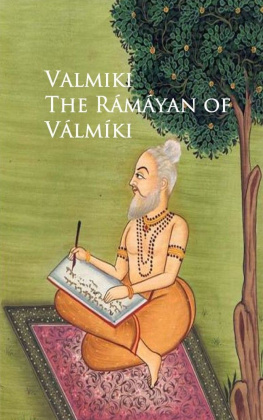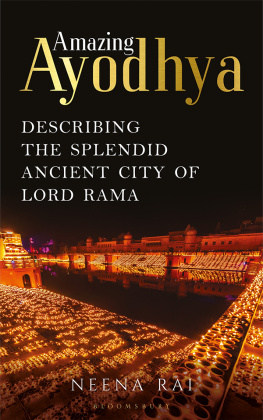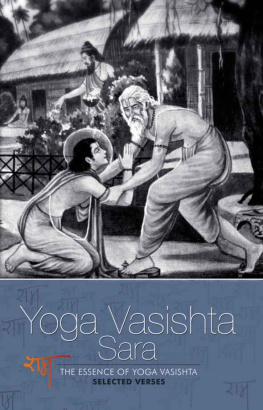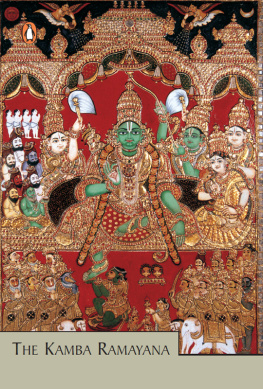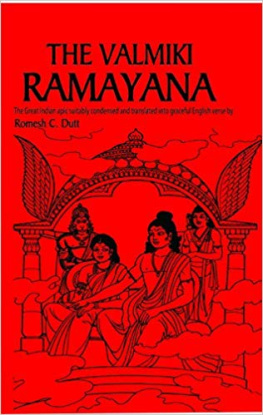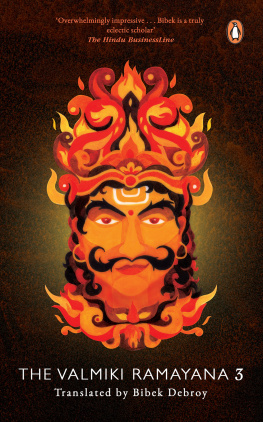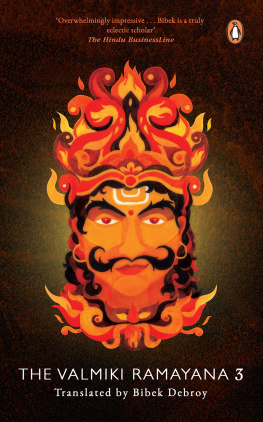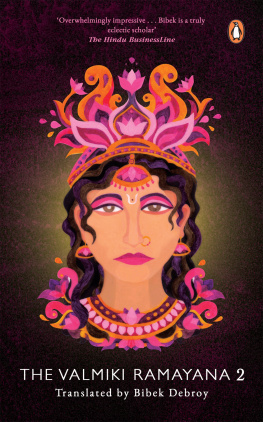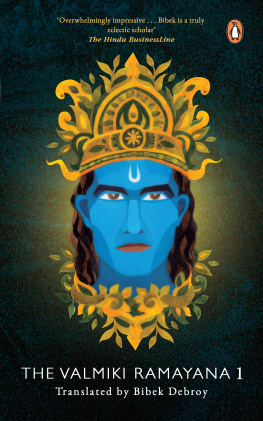Valmiki - Rama the Steadfast
Here you can read online Valmiki - Rama the Steadfast full text of the book (entire story) in english for free. Download pdf and epub, get meaning, cover and reviews about this ebook. year: 2010, publisher: Penguin Group USA, Inc., genre: Children. Description of the work, (preface) as well as reviews are available. Best literature library LitArk.com created for fans of good reading and offers a wide selection of genres:
Romance novel
Science fiction
Adventure
Detective
Science
History
Home and family
Prose
Art
Politics
Computer
Non-fiction
Religion
Business
Children
Humor
Choose a favorite category and find really read worthwhile books. Enjoy immersion in the world of imagination, feel the emotions of the characters or learn something new for yourself, make an fascinating discovery.
Rama the Steadfast: summary, description and annotation
We offer to read an annotation, description, summary or preface (depends on what the author of the book "Rama the Steadfast" wrote himself). If you haven't found the necessary information about the book — write in the comments, we will try to find it.
Valmiki: author's other books
Who wrote Rama the Steadfast? Find out the surname, the name of the author of the book and a list of all author's works by series.
Rama the Steadfast — read online for free the complete book (whole text) full work
Below is the text of the book, divided by pages. System saving the place of the last page read, allows you to conveniently read the book "Rama the Steadfast" online for free, without having to search again every time where you left off. Put a bookmark, and you can go to the page where you finished reading at any time.
Font size:
Interval:
Bookmark:

RMA THE STEADFAST
THE AUTHOR of the Rma story is known only from the content of his work. He was an oral poet speaking a distinct dialect of Sanskrit in the central Ga g region of northern India in about the fifth century BC . He was a man with the traditional outlook of a man, familiar with the interests and pursuits of the warrior class in a small, agriculturally based kingdom within which there was as yet limited social differentiation, still observing an archaic pattern of worship. He was also a perceptive craftsman, skilled and sensitive, whose work was appreciated, emulated and augmented by generations of successors.
g region of northern India in about the fifth century BC . He was a man with the traditional outlook of a man, familiar with the interests and pursuits of the warrior class in a small, agriculturally based kingdom within which there was as yet limited social differentiation, still observing an archaic pattern of worship. He was also a perceptive craftsman, skilled and sensitive, whose work was appreciated, emulated and augmented by generations of successors.
It is clear that the text translated in this volume is the product of many minds and many tongues, but what about the original text? Was there one author or many? Was it, in outline, the product of a single composers mind, or did the story emerge gradually from the coalescence of multiple pre-existent sources? Scholarly opinion is divided.
JOHN BROCKINGTON was educated at Mill Hill School and Corpus Christi College, Oxford. He is emeritus Professor of Sanskrit in the School of Asian Studies (of which he was the first Head) at the University of Edinburgh. His books include The Sacred Thread (1981), Righteous Rma (1985), Hinduism and Christianity (1992) and The Sanskrit Epics (1998). His special area of research is the Sanskrit epics. He is the Secretary General of the International Association of Sanskrit Studies.
MARY BROCKINGTON was educated at Homelands Grammar School, Derby, and St Hildas College, Oxford. She has edited three volumes of Indological papers and published several articles on the Rmyana, the Mahbhrata and the Harivama, and on traditional tales and early literature in Europe and South Asia. Her research is focused mainly on narrative strategies and on performance.
Rma the Steadfast
An Early Form of the Rmya a
a
Translated by
JOHN BROCKINGTON and MARY BROCKINGTON
PENGUIN BOOKS
PENGUIN CLASSICS
Published by the Penguin Group
Penguin Books Ltd, 80 Strand, London WC2R 0RL , England
Penguin Group (USA) Inc., 375 Hudson Street, New York, New York 10014, USA
Penguin Group (Canada), 90 Eglinton Avenue East, Suite 700, Toronto, Ontario, Canada M4P 2Y3
(a division of Pearson Penguin Canada Inc.)
Penguin Ireland, 25 St Stephens Green, Dublin 2, Ireland
(a division of Penguin Books Ltd)
Penguin Group (Australia), 250 Camberwell Road, Camberwell, Victoria 3124, Australia
(a division of Pearson Australia Group Pty Ltd)
Penguin Books India Pvt Ltd, 11 Community Centre, Panchsheel Park, New Delhi 110 017, India
Penguin Books (NZ), cnr Airborne and Rosedale Roads, Albany, Auckland 1310, New Zealand
(a division of Pearson New Zealand Ltd)
Penguin Books (South Africa) (Pty) Ltd, 24 Sturdee Avenue, Rosebank, Johannesburg 2196, South Africa
Penguin Books Ltd, Registered Offices: 80 Strand, London WC2R 0RL , England
www.penguin.com
First published in Penguin Classics 2006
Copyright John Brockington and Mary Brockington, 2006
All rights reserved
The moral right of the translators has been asserted
Except in the United States of America, this book is sold subject to the condition that it shall not, by way of trade or otherwise, be lent, re-sold, hired out, or otherwise circulated without the publishers prior consent in any form of binding or cover other than that in which it is published and without a similar condition including this condition being imposed on the subsequent purchaser
ISBN: 9781101493595
Journey steadfastly, my son; may your path be safe and free from all danger, and may fortune and prosperity attend your return.
[2,31.26]
The translators wish to thank various friends and colleagues for support and advice, in particular James L. Fitzgerald and the late Alison Smith. John Brockington also gratefully acknowledges the award of a Leverhulme Research Fellowship which greatly assisted work on this translation.
(Readers are warned that elements of the plot are discussed in this Introduction; for necessary background information see the Note to the Reader.)
Rma, the hero who became God
Ever since about the twelfth century AD the warrior-prince Rma has been widely recognized and revered in India as God. This understanding did not result from a single, sudden, historical revelation like the birth of Christ or Mohammed; it developed over many centuries, and it will continue to develop. As faith in Rmas divinity has grown, devotees have turned for spiritual insight and revelation to the tale of his earthly heroism, the tale of Rma the steadfast mortal hero, of his selfless preservation of his fathers integrity, of his quest for his lost wife and his triumphant battle to rescue her.
This tale had by then already been being told, heard and retold for many centuries in a long Sanskrit narrative poem known as the Rmya a belonging to that diverse category of early literature collectively labelled anonymous. Indian tradition and most Western scholars are united in believing that it was originally composed orally, and transmitted for several centuries by oral recitation, but opinion is divided about the date of composition: Indian tradition would place it several millennia ago, while scholars have proposed various later periods. Based on the language, style and content of the work, we suggest a date of roughly the fifth century BC . The Mahbhrata, an even longer Sanskrit narrative poem, probably originated at much the same time. It is the earliest levels of the story that have been translated in this book, that is to say, those passages which can be identified as the work of the original author as augmented by his immediate successors; these passages, detailed in the Note on the Text Translated, which have been identified by careful evaluation of the linguistic evidence, together represent the first stage of development of the tale.
a belonging to that diverse category of early literature collectively labelled anonymous. Indian tradition and most Western scholars are united in believing that it was originally composed orally, and transmitted for several centuries by oral recitation, but opinion is divided about the date of composition: Indian tradition would place it several millennia ago, while scholars have proposed various later periods. Based on the language, style and content of the work, we suggest a date of roughly the fifth century BC . The Mahbhrata, an even longer Sanskrit narrative poem, probably originated at much the same time. It is the earliest levels of the story that have been translated in this book, that is to say, those passages which can be identified as the work of the original author as augmented by his immediate successors; these passages, detailed in the Note on the Text Translated, which have been identified by careful evaluation of the linguistic evidence, together represent the first stage of development of the tale.
Scholars are in the habit of referring to the Rmya a and the Mahbhrata alike as epics, but their origins are cast in very different genres, and in the case of the Rmya
a and the Mahbhrata alike as epics, but their origins are cast in very different genres, and in the case of the Rmya a the term epic can justifiably be applied only to its later, developed form; the story lying at its heart would in Western literary terms best be classified as a heroic romance, for it is the personal story of the Prince, a lone figure, supported in his adventures only by a younger brother who functions merely as his squire or confidant, and the outcome affects only himself and the individuals he encounters: no wider or national interests are involved. It is the struggle for integrity and happiness of one man, not a war of conquest. Victory for Rma twice involves transfer of sovereignty merely between bad and good members of the same family, and while defeat for him would be a private grief for those close to him, the destiny of his subjects would be unaffected. In the Mahbhrata the situation is quite different: that text chronicles a bitter struggle for sovereignty between two groups of cousins, with the fate of several kingdoms depending on the outcome, and explores the issue of how far it is permissible for the heroes to compromise their integrity in pursuit of their legitimate claim and still remain fit to rule. Indian tradition too distinguishes between the two works, designating the
a the term epic can justifiably be applied only to its later, developed form; the story lying at its heart would in Western literary terms best be classified as a heroic romance, for it is the personal story of the Prince, a lone figure, supported in his adventures only by a younger brother who functions merely as his squire or confidant, and the outcome affects only himself and the individuals he encounters: no wider or national interests are involved. It is the struggle for integrity and happiness of one man, not a war of conquest. Victory for Rma twice involves transfer of sovereignty merely between bad and good members of the same family, and while defeat for him would be a private grief for those close to him, the destiny of his subjects would be unaffected. In the Mahbhrata the situation is quite different: that text chronicles a bitter struggle for sovereignty between two groups of cousins, with the fate of several kingdoms depending on the outcome, and explores the issue of how far it is permissible for the heroes to compromise their integrity in pursuit of their legitimate claim and still remain fit to rule. Indian tradition too distinguishes between the two works, designating the
Font size:
Interval:
Bookmark:
Similar books «Rama the Steadfast»
Look at similar books to Rama the Steadfast. We have selected literature similar in name and meaning in the hope of providing readers with more options to find new, interesting, not yet read works.
Discussion, reviews of the book Rama the Steadfast and just readers' own opinions. Leave your comments, write what you think about the work, its meaning or the main characters. Specify what exactly you liked and what you didn't like, and why you think so.


